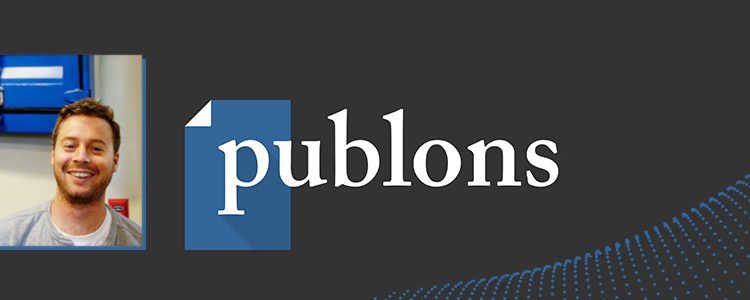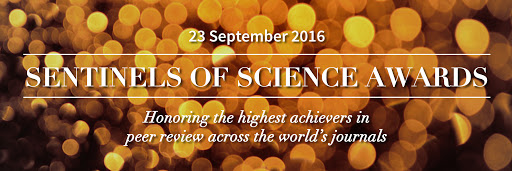Connecting Scholarly Publishing Experts and Researchers: Interview With Andrew Preston

As part of our interview series on Connecting Scholarly Publishing Experts and Researchers, we had the opportunity to speak with Andrew Preston, the Co-founder and CEO of Publons over e-mail. Publons is an organization that aims to speed up scholarly research and give peer reviewers the recognition they deserve for their efforts.
As a young entrepreneur, what was your inspiration behind launching Publons?
Peer review is the heart of research. It is central to our ability to trust and understand research. We all know that, yet we have developed a system that ignores the work of reviewers and obsesses about our publication records instead. Publons was founded in order to bring some balance back to the system.
We believe that reviewers need to be recognized for their contributions to research. More than 1,000 journals now integrate with Publons to recognize their reviewers and over ninety thousand researchers have registered at Publons.com to get recognition.
But recognition is just the start. We believe that improving peer review will improve all of research. That’s why we are working on things like the Publons Academy, tools for editors, and new ways for institutions to recognize review.
How exactly does Publons help reviewers to get recognition?
Once a reviewer registers with Publons, they can add the record of reviews they have performed. Publons works behind the scenes to verify these records and for more than 1,000 journals, reviewers are able to have reviews automatically added to their record simply by ticking a box during their review.
Reviewers can then download that formal record and use it as evidence on their CV, during performance reviews, and in funding applications.
We hope the main benefit of Publons is to science and to research. By recognizing researchers, we help them to show that they are experts in their field, they review more, and together we speed up the whole process. For an individual researcher, becoming a reviewer is one of the best ways to kick-start your career.
This is a question many authors/researchers have. As a verified peer reviewer, which aspects about peer review would you want all authors to know about? (including how does one start the process of becoming a peer reviewer?)
This is a really important topic. Everyone knows that peer review is important, but few people know how the actual system works, and there is no obvious way to start becoming a reviewer.
This is why we are working on the Publons Academy, a course that helps researchers learn how to review. We then connect graduates of the academy with editors at major journals, helping researchers to become expert reviewers and gain recognition in their field.
If you’re reading this and are interested in becoming a peer reviewer, or learning about how peer review works, then I strongly suggest you check it out: https://publons.com/community/academy/.
As the CEO of Publons, what makes you most proud about Publons?
Researchers have added more than half a million reviews to Publons. I’m incredibly proud to be able to say that! We’ve built a great team and group of advisors but I think we’d all agree that we’re just getting started and that the things we’ll be most proud of are still to come.
Can you tell us some of the challenges that you faced in establishing Publons?
It was a new thing. Recognition for peer review was a fairly novel idea when we got started. Three years later we’re at the point where the publishing industry has started to recognize the importance of peer review (4 of the top 7 publishers use Publons), but there’s still a long way to go before universities and funding agencies start to assign it the value it deserves.
What are the primary areas Publons has been focusing on in this year?
This year we’ve focused heavily on raising awareness about the critical importance of peer review and forming partnerships with the world’s top publishers to make it easier for researchers to build their review records.
What are some of the initiatives that have been undertaken to bring awareness about this to peer reviewers all over the world?
The big event this year was the Peer Review Week, which we were proud to be a part of alongside many major publishers.
Great! And this year’s Peer Review Week also saw the launch of the first Publons’ Sentinels of Science Awards that honors the highest achievers in peer review across the world’s journals! Can you quickly take us through the nomination process?
Yes! We think of the awards as the Nobel Prizes for peer review – honoring the elite contributions to peer review in any given year. It’s important because breakthrough research, like the kind we recognize through the Nobels, is reliant on expert peer reviewers for validation.
That’s one of the reasons we developed the awards – to acknowledge the experts who help make breakthrough research possible through their outstanding peer review contributions.
For the inaugural awards, we honored the reviewers who had completed the most verified pre-publication reviews across a few different categories, with prizes for the top 3 reviewers overall and certificates for the top 10% of reviewers in each research field. You can see the winners and find out more details here:
The great thing about the awards is that we were able to recognize the reviewing efforts across all publishers. We also had support from heavyweights like Wiley, SAGE and Springer Nature, which showed that there is now a real commitment to recognizing reviewers.
The awards are a nice way to give back and we’re excited to build on them each year and to look at ways to reward quality as well as quantity.

What has been the impact of this service in markets like Asia and how does Publons deal with bogus reviews particularly from this region and other ethical concerns? Also, are there any specific challenges when it comes to peer review management in this region or are the challenges universal?
There do seem to be some systematic challenges for peer review in the Asian market. Publons certainly has fewer users here than we would expect. We suspect this is more related to the challenges that publishers have in identifying and contacting Asian researchers who might be interested in review assignments than it has to do with any other regional differences.
Should peer reviewers receive some kind of standard training so that there is a larger common understanding about the overall process? Or should there be some common resources? What are the challenges associated with implementing a system like this?
Absolutely. We think this is essential. One of the main challenges we’ve identified is that even for researchers that are experts in their field, it is quite hard to prove to editors that they will be good reviewers. I think companies like Enago can really help by providing resources, information, and services.
For our part, we take a peer review-centric approach. Publons Academy, which I mentioned earlier, is intended to solve this problem by helping researchers to show their ability to review and to connect them directly to editors at top journals. We hope this is the first step to getting more researchers involved in the peer review process.
You have a Ph.D. in Physics from Victoria University of Wellington and you also did your Post-Doctoral Fellowship from Boston University. How was your research journey like? (Highlights, Experiences, Challenges)
I studied physics because I always wanted to understand how the universe worked. Learning a part of that was an amazing experience and something I’ll always continue to be interested in. Research is a little different because you’re out at the frontier of human knowledge. Out there it’s less about learning because you’re dealing with the unknown. The main challenge is figuring out how to ask the right questions (i.e. form hypotheses).
I was very lucky to be able to experience all of that, to meet some great people, and to learn how research is done in different parts of the world.
What advice would you give young entrepreneurs wanting to pursue their ideas as a business in academic publishing?
Well, the first thing I would say is that every business is different and can succeed in all sorts of different ways, so just get on with it. That said, I think one really important thing you can do is figure out who the people are that would be using your service and talk to as many of them as possible about what you plan to build. The easiest mistake you can make is just to build something and assume people will use it.
Has there been a pivotal moment or key person in your career development? (Please describe)
It was a difficult decision to leave my post-doc because leaving academia is sort of a one-way decision that’s hard to reverse. In retrospect, it was definitely the right thing to do. If a decision is hard that means the options are roughly as good as each other, so go with your gut.
It was a great pleasure to talk to Andrew Preston. We sincerely thank him for taking the time to be part of this interview and also wish the entire team at Publons all the very best.
(This interview is a part of our interview series of connecting scholarly publishing experts and researchers.)




